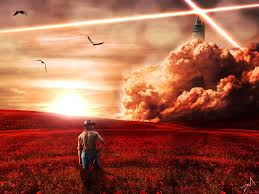Childe Roland to the Dark Tower Came is one of the most famous poems from the 1855 poetry collection Men and Women by Robert Browning. Like many of the other masterpieces by Browning, this poem is also a long dramatic monologue that has been narrated by Childe Roland, a character in Shakespeare’s King Lear.
The title of the poem is derived from a song that the character Roland sings in the play. Roland, a mad alter ego of a sane man speaks of the horrors of the journey to the Dark Tower in the poem.

Childe Roland to the Dark Tower Came Summary
The dramatic monologue opens with Roland, a young boy who is yet to be knighted, speaking of a cripple who is guiding him on his quest to find the Dark Tower. It is not clear what he will actually find in the tower, but he is adamant and determined to complete this journey.
However, he does not trust the cripple and feels that maybe he is lying to him and giving him the wrong directions. But because Roland is devoid of any company, he plans to trust him and continue in the direction that the cripple tells him about.
The journey of Roland to reach the Dark Tower is full of agony and suffering. He is completely aware that the end of the journey is the end of his life. But even then, he continues on his path for the sake of completing this journey like the other knights who have taken up this journey before him. As he is walking on the road the cripple has guided him to, he looks back to find that the cripple has disappeared.
Roland continues his journey and starts to think about his friends Giles and Cuthbert. Ironically, both of them have been known to betray their friends. As Roland recalls this fact, he senses a deep pain and feels that the pain is similar to the struggle of the journey that he is undertaking.
He walks ahead to find a tree standing in between a river that he is supposed to cross. The sight of the tree fills him with doubts again but is not enough for him to stop walking in the direction of the tower.
Roland continues to walk in search of the Dark Tower, thinking about how knights before him have taken up the same journey. He imagines that he will be united with those knights after he is dead from completing his journey when his attention is attracted by a black bird.
The black bird is flying overhead and he looks at the bird to realize that he has reached a valley and is surrounded by mountains. As he is thinking about crossing the mountains to continue his journey, he sees something without any doors and windows between them and concludes that this is the Dark Tower where he is supposed to reach.
He looks up to find that all the knights have failed and are hovering around the tower. He still blows his horn to signify that he is coming to the Dark Tower to conclude his journey.

Childe Roland to the Dark Tower Came Analysis
Childe Roland to the Dark Tower Came is a very complex piece in which Browning has worked on creating a mood. The mood of the poem has been developed using external scenery but it resonated the internal feelings of Roland, the Childe. He uses these images to create a complex emotional journey that Roland is going through in search of the Dark Tower.
The various metaphors that are used by Roland to explain the things that he is encountering on the way to Dark Tower describe his mental state perfectly. He is pursuing a path that knights have failed on, even though he is a Childe who has not been knighted yet. But his determination to follow it and reach the Dark Tower signifies that there is nothing much in life for him to look forward to.
The Dark Tower that Roland seeks and the way he reaches there is also full of ambiguity. Roland is walking continuously before he realizes that he has reached the mountains. Without a door or a window, he confirms that he has seen the dark tower, even though he is not sure about the place where he is right now.
This evokes the feeling that maybe there is no dark tower or death is the dark tower itself. He sees the knights and decides that he has reached which maybe because Roland is now tired and has realized that it is impossible for him to cross the mountains. He finds a sense of pleasure in his realization and starts walking towards what he sees, blowing his horn.
If you like the poem, you can read the complete text here.